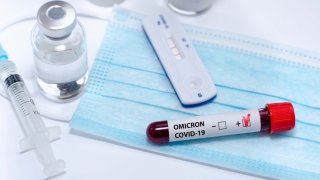
With the omicron variant leading to increased infections in people who previously had COVID-19, is it possible that someone who has an omicron case now could contract the same strain of the virus again?
The answer isn't exactly clear yet, according to public health experts.
Chicago Department of Public Health Commissioner Dr. Allison Arwady said such information remains to be seen.
"So typically, we have seen that for about three months or so after somebody has been infected with a particular strain of COVID, they are very unlikely to be infected again with that strain," Arwady said during a Facebook Live Tuesday. "I think we're still learning a little bit about that with omicron. And because we saw that, compared to all the ones that came before [omicron], people who had had [COVID] in the past were five times as likely to get infected again and so... that's one of the one of the questions that people are still looking at. I would say, you know, unofficially while we're waiting for the data to come in, I would expect that somebody who has just had, if you knew that it was omicron, you would probably be unlikely to get omicron again for the next few months based on what we've seen previously, but I'm less confident in that statement than I would have been for prior variants, given what we've seen."
Feeling out of the loop? We'll catch you up on the Chicago news you need to know. Sign up for the weekly Chicago Catch-Up newsletter here.
Other health experts agreed.
"The question of whether you can be reinfected by the same strain of COVID-19, and how likely it is, is up in the air," according to an article by Dr. Michael Dreis in GoodRx Health.
Dr. Amesh Adlja, a senior scholar at John Hopkins Center for Health Security, told KHOU-TV in Houston that it's unclear what level of immunity occurs after an omicron infection.
"I suspect over time, yes, you probably can get reinfected," he said. "But we don't have that data yet because omicron has only been around since October/November.”
In mid-December, a study conducted in the United Kingdom found the risk of COVID reinfection with the omicron variant was more than five times higher than delta, Reuters reported.
The study by Imperial College in London didn't find any evidence that omicron's severity was any different than delta's. However, some researchers contended it was important not to overinterpret the findings, saying sufficient data wasn't yet available.
Arwady noted that reinfections being seen currently in the U.S. are largely in those who previously had a different strain of COVID.
"It's not like we've seen a lot of people get, you know, I had Omicron, I get omicron next week. That's not what we see," she said. "I think more of the people that we're seeing get reinfected right now are people who... did not have omicron, just given the timing."
She added, however, that those who develop a breakthrough infection can expect to have some sort of boost in immunity.
"Get your vaccine, get your booster, and then if you've had breakthrough, you know, I would take some consolation that you've sort of gotten a little bit of a booster the other way too, in terms of the other way that you're teaching your immune system," she said. "And I would think you would be relatively protected for the next three months if I had to take a guess, but I don't have solid data on that yet."

